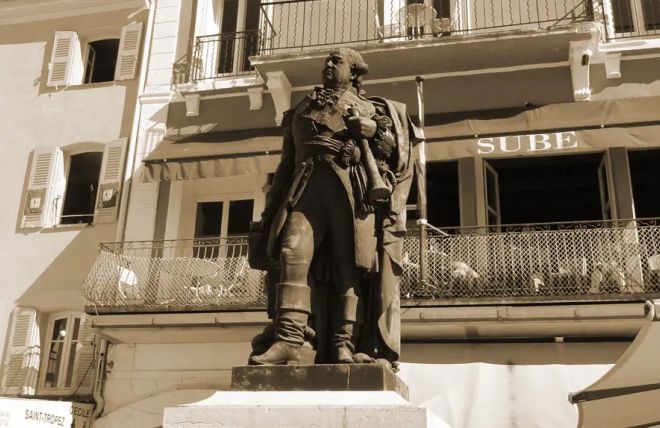Legends of the Beaches of Saint-Tropez
Enchanting Tales of Sand and Sea
Delve into the Fascinating History of Saint-Tropez Beaches and Explore the Enigmatic Origins of their Iconic Names
Plunge into the fascinating history of Saint-Tropez beaches and explore the enigmatic origins of their iconic names. Discover the legends and stories hidden behind these mythical appellations and let yourself be transported to the magical universe of the French Riviera.
Origins of the Names of Saint-Tropez Beaches
The beaches of Saint-Tropez, with their fine sands and crystalline waters, are not only havens of relaxation but also witnesses to the history and culture of this renowned seaside resort. Each beach carries a name of its own, and behind these names lie captivating stories. Let's together uncover the fascinating origins of the names of Saint-Tropez beaches.
Thus, each beach name in Saint-Tropez holds a part of the history, geography, or culture of this magnificent region. By discovering the origins of the beach names, we also connect to the very essence of Saint-Tropez—a symbolic destination that combines natural beauty, heritage, and Provençal charm.
- Pampelonne Beach: The name of this iconic beach is often associated with the famous French song "Pampelonne" by artist Gilbert Bécaud. It is said that Bécaud, charmed by the beauty of this beach, wrote this song in its honor. The name itself might have older origins, possibly related to the presence of palm trees on this beach in the past.
- Salins Beach: The name of this beach originates from the salt marshes that once surrounded this area. The salt flats were used for salt production, an important economic activity in the region at the time.
- Bouillabaisse Beach: The name of this beach pays homage to an iconic dish of Mediterranean cuisine, bouillabaisse. This delicious fish stew is a local specialty, and the beach bears its name due to its proximity to many restaurants renowned for serving this flavorful dish.
- Tahiti Beach: The exotic name of this beach evokes the charm and exoticism of the Polynesian islands. Tahiti Beach is renowned for its natural beauty and tropical ambiance, reminiscent of the paradisiacal beaches of Tahiti.
- Escalet Beach: The origin of the name of this beach is uncertain, but it is said to be related to a Provençal term for a small ladder or stairway. This could refer to the narrow and winding paths that lead to this beautiful beach.
- Moutte Beach: The name of this beach is related to the presence of "mottes" or piles of earth in the region. This name can also be associated with particular rock formations present on the beach.
- Caneliers Beach: The name of this beach is inspired by "caneliers," typical shrubs of the Mediterranean region. Caneliers surround the beach, adding a touch of greenery and charm to this paradise-like spot.
- Fontanette Beach: The name of this beach might be derived from the word "fontaine," meaning a freshwater spring. This natural fountain used to provide drinking water to the local inhabitants.
- Graniers Beach: The name of this beach is linked to "granières," places where grain was once stored. These structures were used to protect grain reserves from weather and pests.
- Ponche Beach: The name of this beach is associated with the Provençal term "la poncha," meaning "the small bridge." This name could refer to a bridge that once existed in this location or a particular crossing point for fishermen and sailors.
- Glaye Beach: The name of this beach is related to the Provençal term "glèia," which signifies a heap of stones or pebbles. This name might refer to the geological features of this beach, with its pebbles and rocks.
- Nartelle Beach: The origin of the name of this beach is uncertain, but it might be related to a Provençal term for a Mediterranean plant called "narthex." This plant was once used for its medicinal properties.
- Canoubiers Beach: The name of this beach originates from the "canoubiers," small canals or streams that once traversed this region. These canals were used for irrigating the surrounding farmlands.
- Garonnette Beach: The name of this beach is linked to the Provençal term "garouneto," meaning "small barn." This name might refer to small stone structures that were once used to store agricultural tools and hay.
- Bastide Blanche Beach: The name of this beach can be translated to "white house" in English. It might refer to a former bastide or country house that was once located near this beach.
- Rabiou Beach: The origin of the name of this beach is uncertain, but it might be related to a Provençal term for a water source or a small river. It could also be associated with a family name or a local historical reference.
- Cigales Beach: The name of this beach evokes the song of the cicadas, the emblematic insects of the Mediterranean region. This beach is renowned for its tranquility and natural beauty, where the song of cicadas accompanies bathers and strollers.
- Jumeaux Beach: The name of this beach might refer to two similar rock formations or to two small islands near the coast. It could also evoke the symmetry and harmonious beauty of this place.
- Battery Beach: The name of this beach is linked to a former military battery that was once located at this spot. These batteries were used to defend the coast and protect the region from maritime invasions.
- Marines Beach: The name of this beach evokes the proximity of the sea and the presence of sailors in this region. Marines were often used as starting points for fishing and navigation activities.






